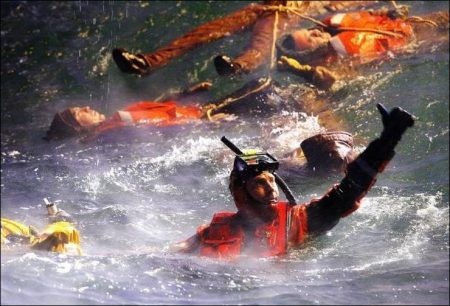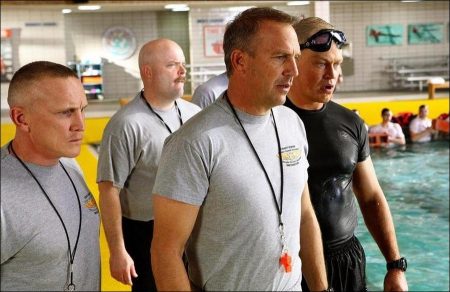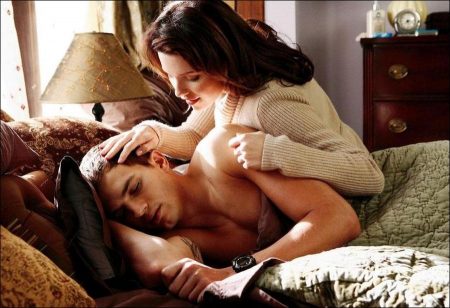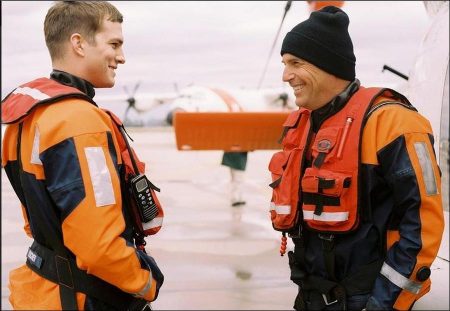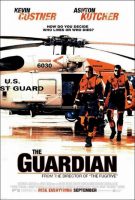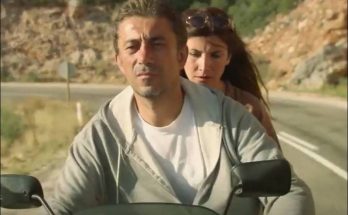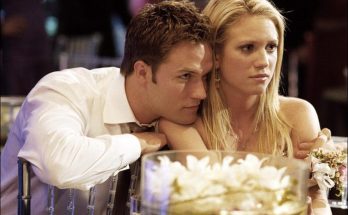How do you decide who lives and who dies?
The Guardian movie storyline. A famed Coast Guard Rescue swimmer (Kevin Costner) is re-assigned to teach at the legendary Coast Guard A School and inspires one cocky rookie (Ashton Kutcher) to learn the true meaning of heroism and sacrifice. After losing his crew in a fatal crash, legendary Rescue Swimmer, Ben Randall (Kevin Costner), is sent to teach at “A” School, an elite training program for Coast Guard Rescue Swimmers. Wrestling with the loss of his crew members, he throws himself into teaching, turning the program upside down with his unorthodox training methods.
While there, he encounters a young, cocky swim champ, Jake Fischer (Ashton Kutcher), who is driven to be the best. During training, Randall helps mold Jake’s character, combining his raw talent with the heart and dedication required of a Rescue Swimmer. Upon graduation, Jake follows Randall to Kodiak, Alaska, where they face the inherent dangers of the Bering Sea. In his initial solo rescue, Jake learns firsthand from Randall, the true meaning of heroism and sacrifice, echoing the Swimmer’s motto…”So Others May Live!”
About the Production
From Andrew Davis, the director of the action-adventure classic “The Fugitive,” and starring Kevin Costner, Ashton Kutcher and a cast of veteran and breakout stars comes The Guardian, a riveting, white-knuckle story of hardcore courage and selfless sacrifice set inside the never-before-seen world of Coast Guard Rescue Swimmers – a special breed of men and women who risk their lives against the biggest storms and most monstrous waves in service to the motto: “So that others may live!” Previously seen by most Americans only as the unsung, daredevil heroes who saved thousands in the wake of Hurricane Katrina’s deadly floods, the lives and teamwork of Rescue Swimmers come to the fore in this heart-stopping adventure.
As The Guardian begins, legendary rescue swimmer Ben Randall (Costner) becomes the sole survivor of a deadly crash at the height of a massive storm. In the wake of the accident, he is sent against his will to teach at “A” School – the elite training program that turns arrogant young recruits into the best and bravest of Rescue Swimmers. Reeling with grief and regret, Ben throws himself into teaching the only way he knows how, turning the entire program upside down with his unconventional, out-of-the-box training methods.
But Ben understands exactly what’s at stake -he knows that his students will one day have to make tough decisions between who dies and who lives. When he knocks heads with the cocky swimming champ, Jake Fischer (Kutcher), Ben sees someone with what it takes to be the best of the best – if only he can combine his raw talent with the heart and dedication necessary and avoid the mistakes that Ben himself has made. Heading out on his first treacherous mission, to the fierce, turbulent waters of Alaska’s Bering Sea, Jake will have to put all that he’s learned into action as he discovers just what it means to truly risk everything.
The film was created with the Coast Guard’s full cooperation, utilizing true-life rescue heroes as advisors and as part of the cast. In a production that was itself constantly battling weather and the elements – and which was designed around a massive, innovative wave tank that simulated the wild, rolling waves of the open ocean – The Guardian provides some of the most viscerally realistic scenes of water rescue yet seen on film.
Introducing the Unsung Heroes of the Sea
There are many kinds of heroes in this world. There are the well-known lifesavers we encounter everyday – firefighters, policeman and doctors – and then there are those who work mainly in the shadows, who will risk anything and everything to save total strangers under the most extreme and rare of circumstances. In this category are the Coast Guard’s extraordinary but little known Rescue Swimmers. These brave men and women are an elite few possessing the uncommon physical and mental fortitude to free-fall from helicopters directly into raging seas and massive storm-floods to rescue those in harm’s way, no matter the costs.
Though rarely celebrated publicly, the Coast Guard saves in the vicinity of 5,000 lives and $2.5 billion worth of property in an average year – and during the devastating 2005 hurricane season, they rescued or evacuated an estimated 33,520 people in the Gulf States ravaged by Hurricane Katrina.
The teeth-gritting training program of the Rescue Swimmers is considered the toughest in all of the military – with nearly 50% of those who enter dropping out. And for those remarkable few who actually make it, what lies ahead are perilous missions in the darkest, coldest, roughest waters known to humankind, where they must battle disorientation, exhaustion, hypothermia and lack of oxygen while trying to help the stranded, the panicked and those who have given up all hope.
In just 20 years of existence, the Coast Guard Rescue Swimmer program has become one of the most respected in the entire military profession. The Rescue Swimmer program was first mandated by Congress in 1984, after a cargo ship tragically lost 31 crew members to stormy waters on the Eastern Seaboard with only one courageous but out-matched Naval helicopter unit to assist. Since then, the Rescue Swimmer program – the only one of its kind open to both men and women – has developed into a crack unit called upon whenever disasters involving high water strike.
Yet their code of quiet bravery has meant that their stories have rarely been told. Many Americans had never seen them in action until the unforgettable news-clips of helicopters plucking victims from the rooftops and floodwaters of New Orleans. Now The Guardian story of a legendary Rescue Swimmer passing his torch to the next generation, brings out the heart of what makes Rescue Swimmers so fascinating: the indomitable human drive to help others.
The film’s genesis began when screenwriter Ron L. Brinkerhoff was inspired to write a movie that would explore the nature of heroism, but was in search of a fresh approach. “Cops and firemen have been done over and over, but the world of the Coast Guard Rescue Swimmer program had never been explored on screen,” he explains. “What I found most compelling is that the Coast Guard is the only branch of the military whose mandate is entirely to save lives… not take them.”
After beginning his research, Brinkerhoff decided to focus his screenplay on two men – one a revered veteran of fabled deep-water rescues nearing retirement, the other a bold, brash, self-assured young man just starting his training – and explore how bravery and wisdom are gained through their intense experiences. “In approaching the story, I wanted to kind of deconstruct the quintessential action hero,” says Brinkerhoff “I wanted to highlight the physical, psychological and emotional toll this kind of profession takes and underline the remarkable sacrifices ultimately required of them as human beings.”
Early on, Brinkerhoff brought the idea to producers Tripp Vinson and Beau Flynn at Contrafilm, who coincidentally had themselves also been considering the world of Rescue Swimmers as the setting for a future film. “We were excited about the idea of combining dramatic human moments with a big action canvas,” says Vinson. “We also wanted to peel back the question of what makes a hero and ask why does somebody do this and what price do they pay. In looking at that, it makes these guys seem even more heroic.”
Before going any further with development, Vinson and Flynn went directly to the Coast Guard for their blessing- knowing their unalloyed support would be absolutely key to bringing a visceral authenticity and heart to the production. “We pitched the Coast Guard before we even pitched Disney,” notes Vinson. “The Coast Guard was integral to this movie and we wanted to make sure they were completely behind us. Ultimately, they invited us into their training facilities, offered up their personnel to us, helped us acquire equipment and the list goes on and on. I can’t say enough about how supportive and inspirational they have been.”
Also coming on board were executive producers Armyan Bernstein, Charlie Lyons and Zanne Devine of Beacon Communications, one of the film industry’s most successful independent production companies, with a keen eye for strong material; and later, executive producer Peter Macgregor-Scott, widely acknowledged as one of the most skilled hands-on producers for complex productions, who has previously worked with Andrew Davis on three films, including the runaway hit “The Fugitive.”
“We’re always looking for compelling stories and when this script came along, I think it touched all of us in the same way as having tremendous potential to be a great experience on screen,” says Bernstein. The more they learned about the Rescue Swimmer program, the more intrigued they became.
Notes Charlie Lyons: “Coast Guard Rescue Swimmers are a unique blend of extreme professional athlete, surgeon, psychiatrist and clergymen. Not only do they have to decide who to save, but it is not uncommon for them to deliver last rites to a victim at sea.”
With the Coast Guard’s cooperation, screenwriter Brinkerhoff now had a chance to dive much deeper into understanding the everyday life and experiences of Rescue Swimmers. He spent significant time at “A” School watching young would-be heroes suffering through the infamous training regimens. He then journeyed to Kodiak, Alaska to meet as many experienced Rescue Swimmers as he could – weaving their life-and-death stories into the final screenplay.
Eventually that screenplay would attract the attention of a director known for his consummate skill with smart, taut, character-driven thrillers – Andrew Davis, whose work includes “The Fugitive,” the dramatically intense action epic which garnered seven Academy Award nominations including Best Picture, as well as “Under Siege,” “A Perfect Murder” and the hit family adventure “Holes” among others.
Says Davis of his attraction to The Guardian: “What’s unique about this story is that it takes you into a world that nobody has ever really seen before. Nobody has actually been in the Bering Sea at night rescuing people, jumping into 20 foot waves in freezing temperatures, and saving lives, so this is a unique opportunity to experience something amazing like that.”
Davis also brings to the film his own life-long fascination with the power and dangers of water. “I was on the South Chicago YMCA swim team, was a lifeguard in college and have a sailboat. I’ve lived near the water all my life – and I’m very intrigued by what it means to go out in a terrible storm and try to survive,” he says.
For the producers there was no one better suited to the daunting task of capturing Rescue Swimmers in action than Davis. “The tension, drama and danger of the situations these characters find themselves in required someone who could convey that in a spectacular visual way and, at the same time, the story needed someone who is really good with character, performances and drama. Andrew has that balance,” says Vinson. Adds executive producer Charlie Lyons: “What Andrew did is create a character out of the ocean right next to Kevin, Ashton and the Coast Guard guys.”
Davis knew that he would be up against extraordinary technical challenges in attempting to create on screen the kinds of furious storms and choppy seas faced by Rescue Swimmers. Though he relished the chance to work with the unruly elements of water and weather, there was far more to the film’s appeal for Davis. Acutely interested in human nature, Davis was especially intrigued by the complex relationship between Kevin Costner’s Ben Randall and his over-confident but promising young student Jake Fischer, played by Ashton Kutcher.
“The story is really about these two men, and about the passing of a mantle — and how the younger man comes to replace the legend,” comments Davis. “What I loved in the writing is the honesty of their relationship. It’s about one man facing the reality of growing older and another learning from his mentor what life is really about and how not to make same mistakes. It’s this human element in the midst of these incredible natural forces that makes The Guardian so fascinating.”
Davis felt right from the start that key to making a powerful motion picture would be to trust the incredible experience and expertise of the Coast Guard. He collaborated closely with three Rescue Swimmer legends in their own right, who served as consultants as well as taking roles in the film: renowned Coast Guard instructor and rescue survival specialist Robert E. Watson; John F. Hall, who was responsible for numerous rescues after Katrina; and Joseph “Butch” Flythe, a much-decorated swimmer and one of five original Rescue Swimmers chosen for the Coast Guard program.
Once they learned that Davis intended to be painstakingly accurate in his portrayal of the Coast Guard, these three self-effacing heroes of countless rescues were more than pleased to lend their knowledge to The Guardian. “The commitment to doing the movie correctly was phenomenal,” says Watson. “Everyone was constantly asking us `is this how things really would be done’? The way they bent over backwards to represent us in a true way was awesome.”
The admiration was even stronger on the other side. Says Andrew Davis: “These three men really set the standard that Kevin, Ashton and the 22 swimmers in our cast had to live up to.”
The Legend Meets the Novice
Even before the screenplay was completed, The Guardian’s filmmakers knew that the fate of the film would turn on being able to cast the right two actors as haunted veteran Ben Randall and high-energy newcomer Jake Fischer – who both antagonize and bring out the best in one another. That’s why they were so gratified when two of Hollywood’s biggest stars immediately signed on: Academy Award winner Kevin Costner and rising leading man Ashton Kutcher.
Costner was an early choice for director Andrew Davis. “He is perfect for this role because he has that kind of masculine power as a leading man combined with being a sensitive human being – so he can play a guy who is not only tough and capable but also looking inward to see where his life is heading,” he says.
For Costner, whose roles have ranged from his passion project “Dances With Wolves” to such blockbuster hits as “No Way Out,” “Bull Durham,” “Field of Dreams” and “The Bodyguard” to the recent acclaimed drama “The Upside of Anger,” the script was hard to resist. “The excitement of the opening and the moving nature of the ending absolutely grabbed me,” he says.
Costner says it was the script’s “mythic quality” that drew him most of all. “I think all of us would like to think if we were lost at sea, someone would come and find us, even when conditions couldn’t be worse,” Costner says. “That’s a comforting feeling, which translates into a heroic or a romantic idea – the notion that someone will always come to the rescue. And I believe that’s the awesome promise of the Rescue Swimmers, that when all the ports are shut, when other people won’t go out, they will! They’re willing to put their lives on the line at any time, and I think screenwriter Ron Brinkerhoff did a great job of capturing the emotions and personalities behind that. From the beginning of the story to its riveting climactic conclusion, there’s the sense of what it’s like to be that person who helps the scared and the lost to hold on.”
The more he learned, the more impressed Costner was with the Coast Guard Rescue Swimmer program. “These guys go out and risk their own lives for complete strangers and that’s something that only human beings do for one another – it’s really one of those things that can make us proud of who we are,” he says.
Costner’s character, Ben Randall, is someone who has always been there right on the frontlines of rescue missions, but now in the wake of a terrible tragedy, he has to face change on the horizon. “Ben reminds me of one of those great athletes like Michael Jordan who keeps coming out of retirement because he still has the bug and he can’t get rid of it,” observes Tripp Vinson. “Rescue is the only thing Ben knows and he can’t let it go and he can’t move on with his life to the next chapter… until he sees himself in this kid, Jake.”
Adds Costner: “Ben’s a lifer. They say you don’t make Rescue Swimmers, you find them and he’s a part of that breed. It’s far more than just a job for him, it’s a calling, but that has also taken its toll. So when we meet Ben, we also see a slightly bruised and broken character.” Despite his flaws, Ben must step up to a new and unexpected mission – passing along his knowledge to a group of raw recruits who have no idea what they will experience ahead. “Ben’s not a natural teacher,” Costner admits, “so his methods are quite unorthodox. He’s faced with these cocky kids and he tries to find ways to give them a strong sense of responsibility.”
The urge to knock some sense into his talented young students reaches its apex with Jake Fischer, whose strength as a swimmer is exceeded only by the power of his youthful confidence. Costner enjoyed the opportunity in The Guardian to watch Ashton Kutcher bring the character of Jake full circle – from tough kid to heroic man — with his own unique touches. “Ashton has an ability to sense the dramatic opportunities that aren’t necessarily on the page, seize them and translate them into dramatic moments on film, thereby making the picture jump a level,” Costner says of his co-star.
On top of the film’s psychological intensity came the physical challenges. Despite having trained for an exceptionally long list of intensely physical, action-oriented roles before, The Guardian jumped right into Costner’s list of the toughest. “This film taxed all my physical abilities,” admits Costner. “I’m 51 and these other guys in the movies are all in their 20s, so the training was a real labor of love for me.”
For Costner it was all worth it just to capture the experience of the Rescue Swimmers who jump in first when someone needs help. “I don’t pretend for a second that I could do what they do – but I think this film feels very real and gives you a grasp and appreciation for who these guys are. It puts you in their place for an exhilarating moment,” he says.
As an award-winning director himself, Costner was especially impressed by Davis’s skill at integrating all the elements of such a demanding production. “Andy was able to deliver a big action movie on a short schedule and a tight budget with many challenging circumstances. As a director, I couldn’t have done what he did,” offers Costner.
Like Costner, Ashton Kutcher was instantly compelled by the script for The Guardian – and saw that it offered an unusual opportunity. “I was definitely looking to do something that was a total departure from what I’ve done before, and this is definitely that,” says Kutcher. “I was also looking for the chance to work with actors who I look up to and who I could learn from. And this film not only offered many opportunities for me to learn and stretch myself, that’s also what it’s about – one generation learning from the one just ahead.”
Kutcher also was inspired to dig deeper behind the exploits of the Rescue Swimmers. “The guys in the Coast Guard are the kind of heroes who don’t talk about themselves,” notes the actor. “And I hold very high regard for those kinds of people.”
Kutcher threw himself with total devotion into the role, knowing he would need to undertake the same kind of grueling training Coast Guard swimmers really go through. “If I was going to do a film about Rescue Swimmers and portray these kind of heroes, I wanted to do them proud,” he comments. “I definitely didn’t want to have somebody else come in and double for me. I figured that these guys are saving lives for a living and for me, as an actor, to get into shape and be able to portray them is small potatoes and the least I could do.”
The actor soon found himself along with the rest of the cast in a gut-wrenching, sweat-inducing boot camp that would test his resolve. “The boot camp with the Aviation Survival Technician teachers was an unforgettable experience,” he says. “I’ve never been yelled at so much by someone I respect so much in my life except maybe my parents. These guys rode us, and they rode us hard! In the actual `A School’ style of training, the instructors never ask the students to do anything that they don’t do. So if they yell at you, tell you to get down and do 40 or 50 push-ups, they’ll do `em right there with you. And so you just have the most enormous respect for them.”
The ultimate result was that Kutcher was able to meet all the stringent requirements of a Coast Guard Swimmer well before the end of his training – including tests of speed, strength and endurance — and his instructors noted that he seemed to have what it takes to join their ranks. Ironically, the biggest challenge for Kutcher in the beginning was his own lack of comfort in the water. “I don’t really like the water,” he laughs. “I mean if I get thrown in a pool, I’m not going to drown, but this is a whole different kind of swimming. The hardest thing for me was simply diving in first thing every morning. Still, I was just happy to be in a wave tank, and not the open ocean, where if something went awry, they could have pulled me out.”
Andrew Davis was very impressed with Kutcher’s devotion to the role. “He did an amazing job preparing for this movie. We needed to find a spunky, worldly kid capable of taking on the mantle of a great Rescue Swimmer – and that’s exactly who Ashton was,” says the director. “I think he gained ten or fifteen pounds of pure muscle in his training.”
Davis continues: “Both Ashton and Kevin brought a lot to the table in terms of developing Ben and Jake. As a director in his own right, Kevin’s sense of timing and character has been an important part of the evolution of the script and Ashton is very smart and a great improviser with a terrific sense of commitment.”
Once on the set, working through risky sequences and emotional confrontations, Costner and Kutcher developed a tight bond that seemed to mirror that of their characters. Sums up producer Vinson: “The real bonus in casting Kevin and Ashton is that they had such great chemistry together. It’s probably the thing that most excited me about making this movie. I think they’re really going to surprise audiences.”
The Guardian (2006)
Directed by: Andrew Davis
Starring: Kevin Costner, Ashton Kutcher, Neal McDonough, Clancy Brown, Melissa Sagemiller, Brian Geraght, Sela Ward, Andrew Schanno, Alex Daniels, Joe Arquette, Joshua Mitcheltree
Screenplay by: Ron L. Brinkerhoff
Production Design by: Maher Ahmad
Cinematography by: Stephen St. John
Film Editing by: Thomas J. Nordberg, Dennis Virkler
Costume Design by: Mark Peterson
Set Decoration by: Gene Serdena
Art Direction by: Andrew Max Cahn, Austin Gorg
Music by: Trevor Rabin
MPAA Rating: PG-13 for intense sequences of action/peril, brief strong language and sensuality.
Distributed by: Buena Vista Pictures
Release Date: September 29, 2006
Views: 64
